#ancient poems
Explore tagged Tumblr posts
Text
《黄鹤楼送孟浩然之广陵》- 李白
Translation of 黄鹤楼送孟浩然之广陵, Sending Meng Hao Ran off at GuangLing to Yellow Crane Tower
huánghèlóu sòng mènghàorán zhī guǎnglíng – lǐbái ( 唐 – táng) 故人西辞黄鹤楼, 烟花三月下扬州。 孤帆远影碧空尽, 唯见长江天际流。 PINYIN: Huáng hè lóu sòng Mèng hào rán zhī guǎng líng Gù rén xī cí huáng hè lóu, Yān huā sān yuè xià yáng zhōu. Gū fān yuǎn yǐng bì kōng jìn, Wéi jiàn cháng jiāng tiān jì liú. ENGLISH: Sending MengHaoRan off to GuangLing at Yellow Crane Tower An old friend is taking leave at Yellow Crane Tower��

View On WordPress
#ancient poems#ancient poetry#chinese poem#chinese poetry#诗词#诗歌#黄鹤楼送孟浩然之广陵#farewell poems#learn chinese poetry#li bai#li bai poems#meng hao ran#meng hao ran poems#poems about leaving#poetry#send menghaoran off at yellow crane tower#tang dynasty#tang dynasty poem#yellow crane tower#孟浩然#孟浩然诗词#孟浩然李白#李白#李白诗词
3 notes
·
View notes
Text



Samuel Taylor Coleridge poem The Rime of the Ancient Mariner Illustrated by Gustave Doré (French, 1832-1883)
#gustave doré#illustration#black and white#art#the rime of the ancient mariner#poem#samuel taylor coleridge#poetry#gustave dore#ship#boat#dark waters#marine art#ocean#waves#water#seascape
10K notes
·
View notes
Text
okay so I was doing a Research™️ about ancient Greek etymology as one does and I found some Things that made me want to Violently Claw My Arms Off please allow me to force feed you my discoveries
So there are 2 words for "not" in ancient Greek, depending on the context: ou and mē. Having introduced himself in the Cyclops episode as " ou tis", or No-man, he then stabs Polyphemus in the eye. When Polyphemus' brothers come to check on him, they say this:
"... surely no man [mē tis] is carrying off your sheep? Surely no man [mē tis] is trying to kill you either by fraud or by force?"
Right after this, after the other cyclopes ditch Polyphemus, Odysseus's inner monologue goes something like this:
"Then they went away, and I laughed inwardly at the success of my clever strategem [metis]." (pronounced mEH-Tis)
Now, there's a difference between mē tis and metis. [mē tis] (pronounced mEH-Tis with a space between the syllables) is the literal translation for "no man". Metis is a word for extreme intelligence/cunning, which is something Odysseus is famous for.
Now, there are several examples of abuse of metis/intelligence in the Odyssey, but I think the juxtaposition between [mē tis], or the concept of anonymity, and metis, or extreme intelligence, is REALLY interesting. Odysseus's adoption of the title "No-man" was characteristic of metis--it was a really smart move that simultaneously hid him from the cyclops and avoided any future consequences. It was a highly effective strategy all wrapped up in a nest little package with a bow on it.
But when he revealed himself as Odysseus of Ithaca, effectively throwing off No-man (anonymity and [mē tis]), that was characterized as idiocy--he's essentially doxxed himself, and now he's doing to (spoiler alert) get tossed around the Mediterranean by Poseidon for the next 10 years.
This is really interesting because it lets you see the parallels/codependency between metis(intelligence) and humility. When Odysseus refused to allow himself to go unnoticed (hubris) he suffered for it. BUT when he declined instant glory/satisfaction (kleos) in order to achieve the long term goal of survival, he was rewarded with Athena's favor (pay attention. This part is important).
And this situation repeats itself MULTIPLE TIMES in the Odyssey--the EXACT SAME THING happens near the end of the book, with the suitors. When. Odysseus is dressed as a beggar and the suitors/Antinious are abusing him, he ACTIVELY CHOOSES not to react--he doesn't stand up and rip off his disguise and start hollering "TIS I, ODYSSEUS OF ITHACA! FEAR MY WRATH"
No. He sits there patiently and waits. He plans and schemes and quietly orchestrates their downfall without alerting them of it. Why? Because he learned his lesson the first time this happened. He buried his rage and adopted what was, according to Grace LA Franz, a more feminine form of metis, weaving a web of destruction for his enemies that ultimately resulted in their total annihilation (see Weaving a Way to Nostos: Odysseus and Feminine Metis in the Odyssey by Grace LaFranz). His patience allowed him to win the whole prize--no questions asked, no 10-year-long-business-trip strings attached--just the sweetness of a full victory. And he is, once again, rewarded with Athena's favor--both in the battle with the suitors and in the aftermath (cleanup/reuniting with Penelope).
This really reinforces the idea in the Odyssey that Odysseus's defining characteristic is not just his intelligence--it's his ability to learn from his mistakes. He used what he learned at the Lotus Eaters Island against Polyphemus--the Lotus Eaters drugged his men, so he drugged Polyphemus. He used what he learned from Circe and Polyphemus against the suitors--Circe used false sweetness and honeyed words to lure his men into a trap, so that's exactly what he did to the suitors. His hubris on Polyphemus' island cost his whole crew their lives, so he intentionally left well enough alone until the right time. He didn't just learn from his failures--he turned them into BATTLE STRATEGY.
i don't care what anyone says that is completely totally and objectively awesome
#Odysseus is a certified baddie 112% of the time#he's literally the coolest you can't convince me otherwise#there's a reason that literally everyone has a crush on him#even the lesbians#its the wordplay. his words#read me a poem in iambic pentameter you bloody stinky man#literally everyone: his sad wet vibes and dark undereye circles have captivated me entirely#odysseus#the odyssey#tagamemnon#odysseus x penelope#telemachus#epic the musical#the cyclops saga#odysseus of ithaca#poseidon#etymology#ancient greece#ancient history
4K notes
·
View notes
Text
Odysseus's fixation upon his son could possibly be explained by the timeline.
A small thing that needs to be said is that according to Homer Odysseus left Telemachus a "newborn" (or at least so Menelaus says in the Odyssey). Interestingly is hard to tell how long Odysseus and Penelope have been married before they had Telemachus because the time line is not cut and clear.
It seems like their marriage took place during the oath of Tyndareus period when Odysseus was at Sparta as a suitor to Helen. From the Oath till Helen's infidelity or abduction or forced seduction by Aphrodite we see there were around 10 years of difference (quite frankly according to some accounts Helen mentions she was 20 years in Troy). That means that he and Penelope were potentially married at least a decade (which makes sense given that he made a wedding bed for her from scratch making it seem that their palace was also being rebuilt at that time)
But if Telemachus was newborn or almost newborn (like let's say about 1 year old tops) that means that Odysseus and Penelope were childless for almost a decade. Either that means they were having some issues aka Odysseus running errands in the kingdom or that they were trying very hard to have children and somehow they couldn't
Do you imagine what this means?
Odysseus potentially had to leave behind a son he wished for for almost a decade full and not to mention that Palamedes nearly killed him, that very son that he potentially tried so hard for and wished for so much!
Hell no wonder he names himself "Father of Telemachus" and quite frankly one can understand why he would hold a grudge against Palamedes (be it Higenius you follow where he frames him or be it Pausanias who says he drowned him) one can imagine why his brain would snap like that! If this hypothesis is correct that is.
#katerinaaqu analyzes#odysseus#greek mythology#the odyssey#tagamemnon#odyssey#the iliad#homer's iliad#homer's odyssey#homer odysseus#homeric poems#homer odyssey#homeric epics#homer iliad#homer#palamedes#odypen#odysseus and penelope#telemachus#odysseus and telemachus#odysseus x penelope#odysseus father to telemachus#ancient greek mythology#epic cycle#odysseus of ithaca#penelope x odysseus#penelope#higenius#pausanias#homer's odysseus
2K notes
·
View notes
Text
people be wondering why there's no appearance from hades in any of the sagas, especially the underworld saga (even if he wasn't in the odyssey itself) i have a theory!
spoilers for vengeance saga and future ithaca saga!
do you not understand how busy that poor guy/god is during odysseus' terrible, horrible, no good, bad journey home™
first he has 7 freshly made pancakes men (14 if you count the club smash noises in survive, but we'll go with 7 for this) sent by chef polyphemus, appearing one after the other.
not long after that, you have 550 very soaked (drowned) men pop through in the blink of an eye, no thanks to his younger brother, mr ruthlessness himself, poseidon.
then while he's still counting/organising the paperwork for them, a young man appears, who happens to be very drunk (talking about pig men?)
not long after that, somehow a warship filled with mortal men breaks into the underworld, ALL ALIVE, and the (king? leader? captain? he's not too sure at this point) starts singing outside his front door about becoming a monster????? but before he can sic cerberus on them, they leave on their own
finally he thinks he has a break when 6 men holding torches (are some missing limbs?!?) have now joined the party down under (granted they're all in no mood to party, they weren't expecting to become snacks for a sea monster)
and just as quick as they'd arrived, in a flash (just like the snap of lightning that took them out) 36 crispy/fried men (gods damn it zeus) appear, weapons drawn like they were about to attack someone (how does that one guy at the front swing such a big sword?)
at this point hades is wondering what the fuck is happening upstairs, because ain't no way these 600 men are all from the same fleet/island under one guy's command (turns out the captain's name is odysseus)
he thinks his prayers are answered because he has had peace for 7 years, just the normal flow of souls into the underworld- (wait whats that chanting)
suddenly those previous 600 souls are flying their way outta the underworld (he didn't know they could do that) while singing "six hundred men! (six hundred)" on repeat
they return though (thank the gods, he didn't need to go soul hunting) and once again he thinks everything will be calm
(he also found out from zeus, that their brother got his godly-ass handed to him by that MORTAL odysseus! WHO USED HIS OWN WEAPON AGAINST HIM (something to help make him laugh over spring & summer and while he waits for his beautiful persephone to return home))
he finally thinks his time with odysseus and the souls that come from him/being around him is over. when in minutes of each other, the souls of 108 men appear, all killed in gruesome ways. then they tell him that they were killed by beggar who then revealed himself as king odysseus, from trying to marry his wife and take over his kingdom (ok very understandable murder then)
at this point hades doesn't know whether he's excited for, or dreading the day he actually meets odysseus in the distant future (yes distant, i don't care about/ don't accept the telegony. let the poor man enjoy the rest of his life with his son and wife!!!)
but yeah, understandable why you don't hear from him throughout the sagas
#hades: i'm hard working & organised#hades: i love and spoil my wife for the six months she's here and then love and miss her dearly for the six she's not#hades: so WHY am i being punished with all this extra work because of ONE MORTAL#hades: *looking at all the souls that keep appearing*#hades: CAN YOU ALL STOP MOVING AROUND?! ITS SO FRUSTRATING WHILE IM TRYING TO COUNT!!#can gods get grey hair? because i feel like this has caused hades some#epic the musical#epic the vengeance saga#hades#hades epic#? i guess#odysseus epic#epic the musical spoilers#epic the vengeance saga spoilers#epic ithaca saga#epic ithaca saga spoilers#can you spoil something when your pulling/using the info from an ancient poem?#*shrugs*
881 notes
·
View notes
Text


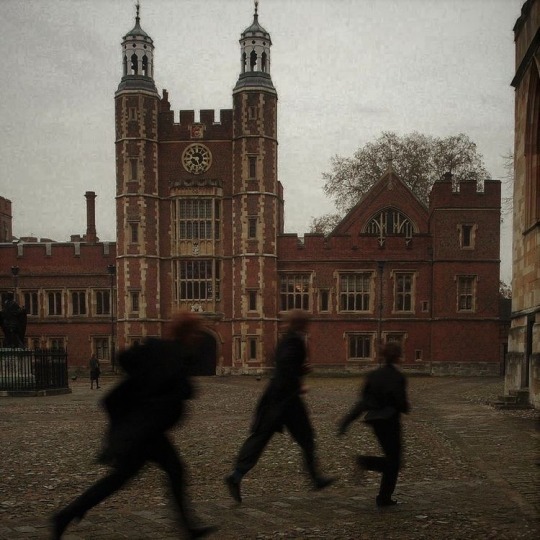






"We didn't care whether we lived or died, and that is the exact reason we lived." - Henry Winter
#the secret history#poetry#poets on tumblr#writers and poets#melancholic#soul#literature#classical literature#dark academia#poems and poetry#writers on tumblr#poems on tumblr#writer and poets#poetsandwriters#poems and quotes#poetic#poem#writeblr#writing#dark acamedia#dark acadamia aesthetic#philosophy#latin language#ancient greek#henry winter#richard papen#bunny corcoran#francis abernathy#charles macaulay#camilla macaulay
2K notes
·
View notes
Text








The Rime of the Ancient Mariner, poem by Samuel Taylor Coleridge (1772-1834), illustrations by Gustave Dore' (1832-1883)
990 notes
·
View notes
Text
i just wanna point out Scylla is known for eating 6 people from every ship, so her attacking 6 men from Odysseus’ ship is on par for the course. only difference is he told 6 men should have torches and were known sacrifices(to Odysseus and Scylla)
Odysseus is not just a captain but also a King, and also known for basically doing war crimes during troy.
he told Eurolyches to light 6 torches, arguably this could have been the 5 men Eurolychus trusted the most so he made them light it.
Eurolyches and the other 5 men were suppose to be warnings against mutiny while also being sacrifices. but Eurolyches lived(probably gave his torch to someone else) and because he lived the seed of mutiny and doubt lived, Odysseus’s warning basically went no where because the one he needed to get rid of lived.
Odysseus wasn’t just bitter and angry, he was trying to get rid of what could actually get them all killed and it failed. he had to chose between himself and the crew, and Odysseus has always been a symbol of humanity in people. is it really a surprise he chose himself?
wouldn’t you choose to save yourself? especially after you gave warning after warning to everyone?
Odysseus did try to get as many as he could home, but in the end they barely if never heeded his warnings.
#the odyssey has always been my favorite because its not black and white#and people making is a black and white issue while also not understanding politics of that time plus ancient greek culture is frustrating#epic the musical#epic the thunder saga#the odyssey#odysseus#currently rereading the poem
460 notes
·
View notes
Text

i'd fall a billion times, but you wouldn't let me ♫
#rain world#rain world oc#rain world au#rw pioneer#antho slugcat#slugcat#tw blood#(only a small amount)#this is the black pearl that contains an ancient poem#which Marbles' name comes from - her identity#apologies for slow updates on my ask blog#the weather is crap and i'm struggling with motivation bleh#kalivasquez#kalivasquezart#2024
181 notes
·
View notes
Text
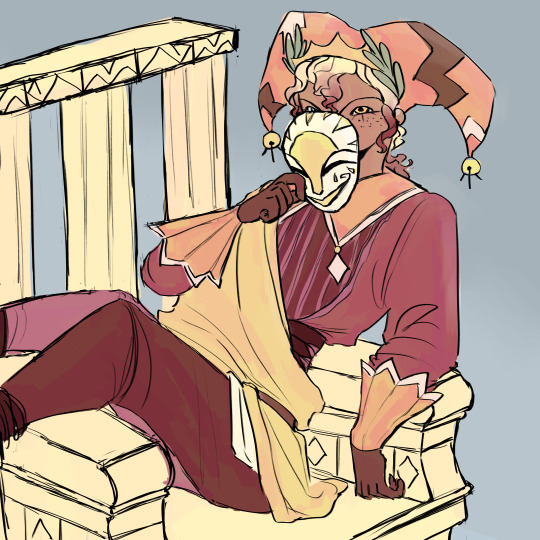
"A Jester can mock, and the King cannot fight
For the gift of free thought is the jester's one right."
A sweet golden prince who lived up in the sky,
Listened to his families' terrible fights,
The ceiling would rumble, the tile would shake,
The throne room was fragile, and soon it would break.
He'd attempt to speak, but it never went right,
His father would rage, and he'd lose every fight,
As decades passed by, it soon became clear,
The King saw his son as a monster to fear.
The Prince quickly followed every command,
Only to be trapped by his father's cruel hand,
Years of destruction with no end in sight,
This war would not end with a large act of might.
And so the Prince stopped fighting fire with fire,
And instead he pulled out his golden stringed lyre,
Since he had no respect, he would leave the King's cage,
And swap out the throne room for a shining stage.
He taunted with wit and he giggled with guile,
And even his sorrow he shared with a smile,
His father's gaze lessened, his temper was tame,
As his once "Golden Prince" treated life like a game.
The centuries passed and the mirth never ceased,
The sun never set on the first son of Greece,
He danced for his siblings and bit down his pain,
Since each peal of laughter meant there'd be less rain.
There's only one role for which there are no rules,
So who is the jester, and who is the fool?
#trials of apollo#toa apollo#lester papadopoulos#apollart#sunny speaks#pulled out everything I remembered from 11th Grade Lit for this poem hopefully it's not shit#I wanted to play on the idea that has been spoken about in some of my fave ToA meta essays#That being that Apollo consciously (or sub-consciously) makes himself seem weaker and less competent to avoid his father's wrath#it is a very interesting part of his character to me I love exploring it#and you know what maybe I also just wanted to draw Apollo in a jester outfit#y'all should know by now that 90% of my motivation is dressing Apollo/Lester up like a Ken Doll#haha#Lester the Jester#just thought of that#also peep my reference to the “my blorbo was born alongside the birth of Ancient Greece” hc that I posted like over a year ago#I just realized I rhymed right and fight twice in the poem GODDAMMIT#Guys I'm a horrible poet Apollo's gonna smite me :'(
263 notes
·
View notes
Text
The Diomedes musical would be called "Son of Tydeus" because even in his own musical his father overshadows him
#epic the musical#diomedes#ancient greek mythology#the iliad#homeric poems#musical theater#diomedes of argos#the epigoni#tagamemnon#son of tydeus the musical
171 notes
·
View notes
Text
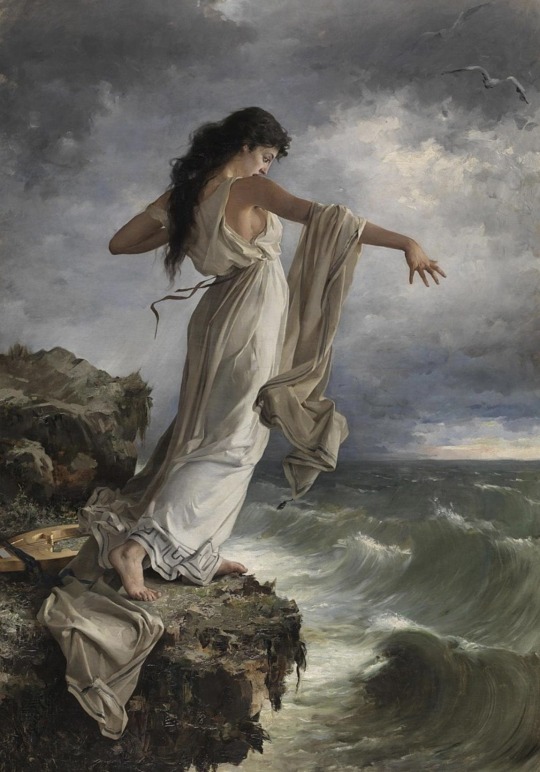
𝖬𝗂𝗀𝗎𝖾𝗅 𝖢𝖺𝗋𝖻𝗈𝗇𝖾𝗅𝗅 𝖲𝖾𝗅𝗏𝖺, 1881 𝘿𝙚𝙖𝙩𝙝 𝙤𝙛 𝙎𝙖𝙥𝙥𝙝𝙤 (ancient Greek poetess)
#art#old art#artists on tumblr#painting#miguel carbonell selva#artwork#canvas painting#portrait#greece#ancient history#ancient greece#poems on tumblr#poets on tumblr#poems and poetry#poetic#poetry#romantic academia#chaotic academia#light academia#dark acadamia aesthetic#dark academia#academia aesthetic#classic academia#girl crying#aesthetic#overthinking#just girly things#philosophy#pinterest#tumblr girls
567 notes
·
View notes
Text
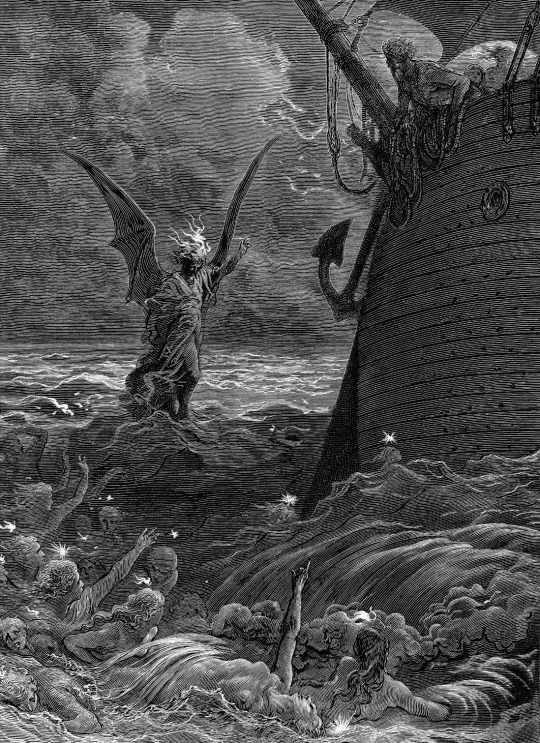

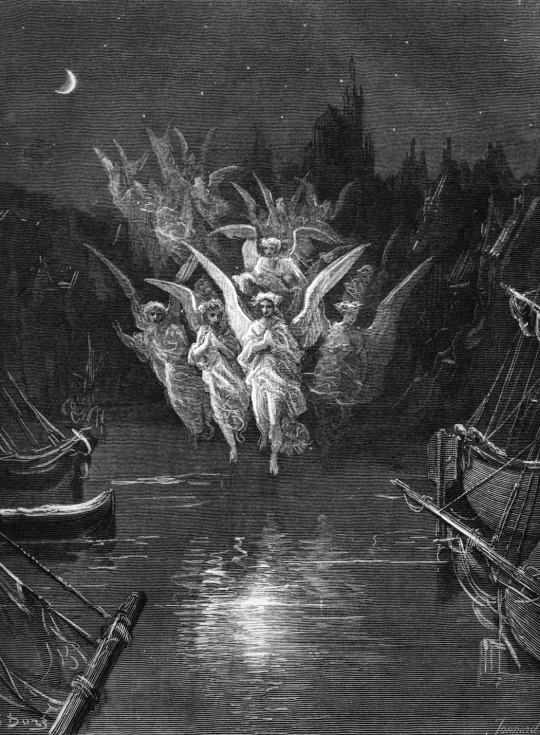



Samuel Taylor Coleridge poem The Rime of the Ancient Mariner Illustrated by Gustave Doré (French, 1832-1883)
#gustave doré#illustration#black and white#art#grey#gustave dore#the rime of the ancient mariner#poem#samuel taylor coleridge#poetry#romanticism#ocean#water#boat#ship#aerial#angelic#wings
5K notes
·
View notes
Text

#the myth of sisyphus#one must imagine sisyphus happy#sisyphus#greek myth retellings#ancient greek mythology#greek myths#greek mythology#albert camus#absurdism#philosophy#bookblr#booklr#book quote#book quotes#books#quotes#books and reading#quote#light academia#dark academia#spilled poem#spilled writing#spilled poetry#spilled feelings#spilled words#spilled thoughts#spilled ink#spilled truth#spilled emotions#spilled heart
200 notes
·
View notes
Text
The Assosiation of Odysseus with the Ram (an Odyssey and Iliad Analysis on Odysseus and Hermes)
Is there no one gonna talk on the fact that Odysseus escapes Polyphemus under a ram? A RAM! The ram is one of the sacred animals of HERMES! Also the association of Odysseus with the ram seems to be blatant and I am surprised no one talks of it! Hermes! The god that is his lineage and also arguably the one that helped him without conditions in his trip...is always there!
Hermes is also called Κριοφορος (Kriophoros)= ram-bearer, due to myths that involve him carry a ram around his back
Also in ancient art, Hermes is also depicted riding a ram!
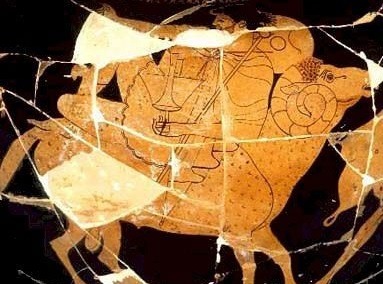
Odysseus escapes Polyphemus and certain death UNDER a ram, when Hermes, the sender of souls to the underworld is depicted ON a ram! What is more the ram as black of color, a color associated to death and mourning as well as Hermes is associated with death!
Hermes is mentioned as "bearer of rams" and yet a lamb now bears Odysseus under it out of the cave!
Of course the most infamous association of Odysseus with a ram is that he is also compared to one! Infamously in the Iliad:

Secondly, the old man upon seeing Odysseus he asked: "Tell me now, dear child, who is that one. He is a head shorter than Agamemnon the son of Atreus but he seems to me wider in his shoulders and his chest, his arms he has them placed upon the well-graised earth. He seems to me like a thick-haired ram the way he prances through the lines of men as if they are a flock of white lambs"
(Translation by me)
Not only does Homer give us a very good physical description of Odysseus in the most beautiful way (ram= thick of hair, possibly curly and wholly -as also described in the Odyssey- possibly hairy of body as well also walking proud and steadily) as well as in a way his demeanour (the word "ram" κτίλος also means "calm" or "demured") but it also seems very interesting how he is associated with an animal known to be sacred to Hermes!
Hermes according to many myths was the father of his grandfather, Autolycus, therefore Odysseus's grea-grandfather! From line one he is associated with an animal that is also associated with his lineage (to me it seems that Homer more or less from line one shows us that this is the family line he follows for Odysseus)
Then a ram is his salvation out of the cave of Polyphemus; a ram that is associated with a god that is said to send souls to the dead also saves his life!
In Aeaea Hermes appears to assist him by giving him Moly and instructions on his trip. Hermes is there all by himself. Other gods have either abandoned him because of his hubris or were not interested in him. Hermes is there to bring assistance on his own accord. (Hermes is also a rule-breaker, just like Odysseus is not the classical figure of a hero and uses methods that are often seen as shady for the ideal warrior)
In the Underworld Odysseus once again has to sacrifice a ram, a BLACK ram and wait for Tiresias to drink from its blood.
A ram is also part of the sacrifice he has to offer to Poseidon (ram, bull and boar).
Hermes comes to bring the message to Ogygia and release Odysseus from it
Odysseus seems to be completely associated with the ram and it is more than just a coicidence to me. Arguably Odysseus who was described as a ram, travels in the Underworld, like Hermes travels to the underworld to bring the souls of the dead! This doesn't seem like a coicidence in my eyes.
Homer seems to be totally insinuating that the ram and consequently Hermes are part of his inheritence. Even the fact that Hermes is often seen as a trickster and a rule-breaker seems to be connected to Odysseus and his behavior or demeanour.
Hermes is also associated as protector of travelers and wanderers and this is exactly what Odysseus is in the Odyssey! Moreover Odysseus and Hermes are associated with the iconography of the hat called petasos:
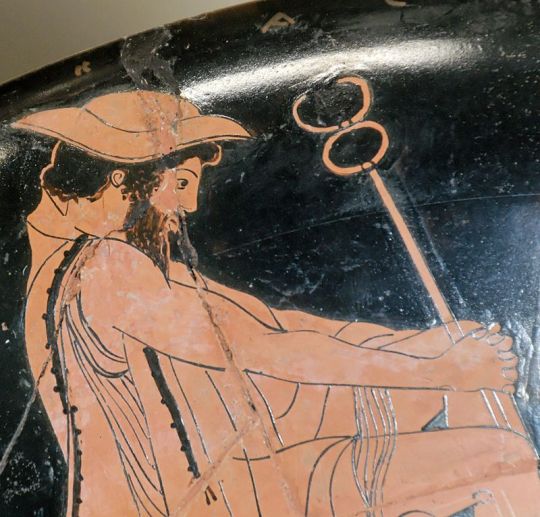

(Odysseus and Hermes)
Also both associated with this double-stafff iconographically, which is a symbol of a messenger! Odysseus often acts like a messenger or as a comittee or as a negotiator! I also daresay that he is also depicted pulling Briseis from the hand, the movement is associated with Hermes as he leads souls in the underworld!
And most importantly; Hermes's epithets among other are Δόλιος (Dolios)=Wily, Deceiving, Planning
And.....
Πολύτροπος (Polytropos)= Of many ways, of many turns
THEY LITERALLY SHARE THE SAME EPITHET!!!!!!!!
Seriously guys his association with a ram is not a coincidence! The dude is practically the perfect combo of Hermes and Athena!! The Ram is Hermes!!!!!
Get mindblown as I am now!
#katerinaaqu analyzes#greek mythology#odysseus#tagamemnon#the odyssey#odyssey#homeric poems#the iliad#iliad#homer odyssey#homer iliad#homeric epics#hermes#argophontes#hermes and odysseus#odysseus and hermes#autolycus#ram#ram-like odysseus#homer#homer's iliad#homer's odyssey#tiresias#odysseus in the underworld#underworld#ancient greek art#ancient greek pottery#petassos hat#archeology#ancient art
586 notes
·
View notes
Text
#literature#aesthetic#nihilism#poetry#books#philosophy#poem#quotes#academia#grunge#dark academic aesthetic#narcissistic personality disorder#dark academia#dark aesthetic#light academia#academia aesthetic#chaotic academia#booklr#books & libraries#ancient greece#greek mythology#stoicism
397 notes
·
View notes